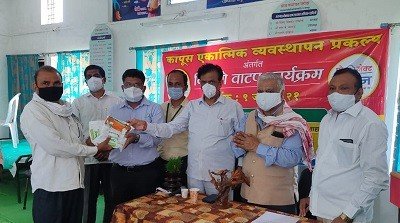Adopts two villages Adasa and Waroda in Vidarbha’s Nagpur district to revive cotton production
The South Asia Biotechnology Centre (SABC) in collaboration with Agrovision Foundation, Nagpur, has launched Project Bandhan: A Knot of PBW Protection to embrace the cutting-edge innovation by tagging PB Knot to protect the cotton plant from devastating pink bollworm (PBW) (Pectinophora gossypiella).
Project Bandhan is supported jointly by PI Foundation and Rasi Seeds and is being implemented across Vidarbha, Maharashtra, in partnership with cotton and textile value chain partners. The project aims at demonstrating mating disruption technology, promoting integrated pest management (IPM) based package of practices (POP) developed by ICAR-CICR, intensifying skill development and training programmes and amplifying effective PBW control measures to farmers across the Vidarbha region. As part of the launching ceremony, Project Bandhan has distributed high-quality Bt cotton hybrid seeds and IPM-based POP in four clusters to 500 smallholder farmers of village Adasa/Waroda of Nagpur.
The unusual outbreak of PBW, a mysterious pest, hit cotton growers hard in Maharashtra in Kharif during 2020-21. There has been a noticeable increase in PBW infestation in Gujarat, Maharashtra, Telangana and Andhra Pradesh in recent years. Though large scale Bt cotton cultivation provides inbuilt protection against notorious American bollworm (Helicoverpa armigera), the emergence of PBW has become the new enemy of cotton farmers. While Helicoverpa infestation resulted in definite yield loss, PBW infestation primarily affects the lint quality, though its early occurrence may even lead to a reduction in yield and significant losses.
“We could pre-empt the emergence of PBW in cotton as we began to address its sporadic occurrence in Bt cotton-growing areas of Gujarat and Maharashtra as early as 2015. Contrary to the American Bollworm, we knew that PBW can be easily managed with proper agronomy, the time of sowing and effective pest control measures. We successfully implemented awareness and training programs across Vidarbha in the last three to four years, consecutively. The outbreak in 2020 was a wake-up call. We seized the opportunity to roll out innovative and environment-friendly mating disruption technology to manage pink bollworm in Kharif 2021,” explained Dr CD Mayee, President, SABC, New Delhi, and advisor to Agrovision Foundation, Nagpur.
The Central Insecticide Board and Registration Committee (CIBRC) had approved the pheromone-based mating disruption technology in the IPM strategies for controlling the population of PBW in India for the first time in 2019-20. Available in the form of the solid metric dispenser rope (PB Knot), it can be easily tagged to the cotton plant. It releases sex pheromones to prevent male moth find females and mating, thus disrupting the reproductive cycle. The mating disruption is emerging as a powerful tool to manage pest such as PBW and has become a part of the IPM module.
“Project Bandhan is an exemplary initiative to promote pheromone-based IPM production system of cotton. The novel PB Knot pheromone technology is easy to use, affordable and environmentally-friendly innovation to manage devastating pest such as PBW,” said Prashant Hedge, CEO (Agri-Business) at PI Industries. “As part of the CSR initiative, PI Foundation is keen to support the area-wide implementation of Project Bandhan and is committed to sustainable agriculture and environmental protection,” Hedge added.
“Rasi Seeds has been supporting the PBW campaign in Vidarbha for the last two years, implemented jointly by the South Asia Biotechnology Centre and Agrovision Foundation. Our joint efforts have resulted in the management of PBW, particularly in Vidarbha. We reinforce our commitment to support the innovative technology and programmes to improve cotton production and farmers’ realisation. Project Bandhan is a unique programme dedicated to showcasing the utility, the efficacy of novel mating disruption technology and IPM-based production system,” stated Dr Ramasami, Chairman, Rasi Seeds.
Adopts two villages Adasa and Waroda in














